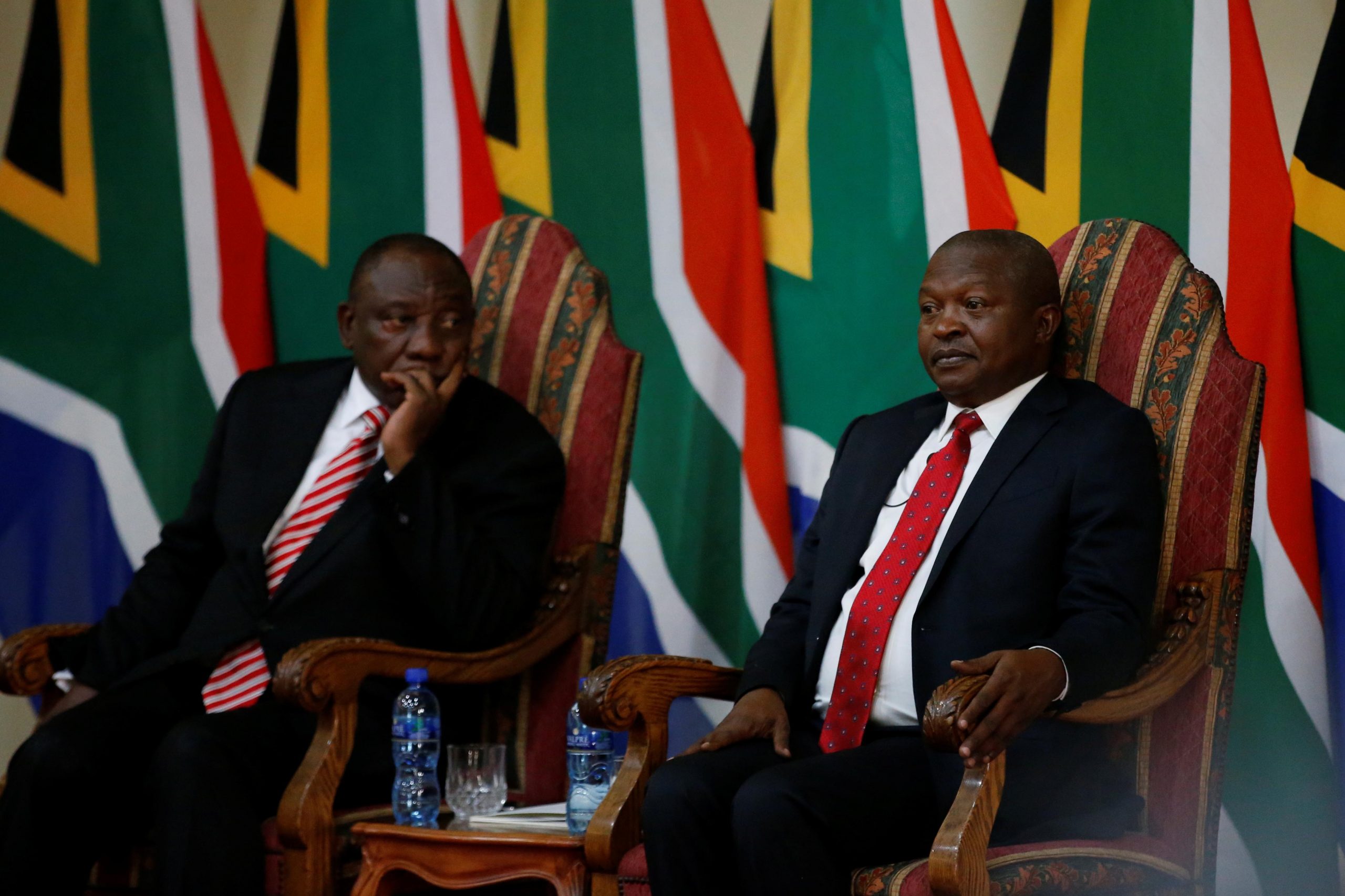New Cabinet is the sun setting on a progressive ANC
With a xenophobe, an authoritarian, and an admirer of the Kagame dictatorship, the 2019 Cabinet offers no hope for a progressive resolution of our escalating social crisis.
Author:
3 June 2019

The bulk of the public discussion around the Cabinet appointed by Cyril Ramaphosa has centred on the inclusion in the “new dawn” of politicians who have been compromised by their association with Jacob Zuma, and the mafia state that developed during his presidency.
This concern is perfectly understandable. Mafia states, usually legitimated by hyper-nationalist rhetoric, have developed in various parts of the world in recent years in the absence of credible progressive alternatives to neoliberalism. Such states have proved disastrous for societies subjected to the repurposing of the state machinery in the interests of private accumulation by a predatory political class, and the repression that inevitably accompanies it. From Hungary to Turkey the mafia state, as Michel-Rolph Trouillot famously said of Haiti under the dictatorship of François and Jean-Claude Duvalier, poses the state against the nation.
We should be profoundly worried that a figure as compromised as David Mahlobo has returned to the Cabinet. And, of course, we should be equally worried by the presence of David Mabuza in the cabinet. But there are many other reasons to be concerned about the new Cabinet that extend beyond complicity with Zuma, and his mafia state.
Concerning appointments
In a country in which people are abused, tortured and murdered by the police with grim regularity, and many people fear the police as much as those more usually designated as criminal, Bheki Cele’s appointment as minister of police is seriously disturbing. He has his own history of complicity with corruption but, more importantly, was one of the key people who drove the militarisation of the police. He has also frequently adopted a reckless macho posture, and made dangerous statements, including the “shoot to kill” controversy, calculated to escalate and legitimate police violence.
Lindiwe Sisulu’s appointment as minister of human settlements, water and sanitation also provokes concern. When she previously held the human settlements portfolio she failed to make any useful contribution to alleviating the housing crisis and championed a turn towards an authoritarian agenda. The Breaking New Ground Policy, officially adopted in 2004, recommended democratic engagement with communities with a view to upgrading shack settlements where they are. Under Sisulu, and other ministers that have held the portfolio since 2004, it has never been implemented.
The Constitution protects unlawful occupiers of land against summary eviction but under all the ministers responsible for housing, including Sisulu, the state has been the primary perpetrator of systematically unlawful and increasingly violent evictions. Impoverished people seeking to engage on questions of urban land and housing frequently confront the state at gunpoint, rather than via democratic deliberation and negotiation.
Related article:
Sisulu also backed the 2007 “Slums Act”, a clear case of what Karl Marx termed “bloody legislation against the expropriated”, which was judged unlawful in the Constitutional Court in 2009. Her flagship housing scheme, the N2 Gateway project in Cape Town, was riddled with controversy and maladministration, and resulted in sustained popular opposition. After residents in the Joe Slovo settlement refused to be relocated to Delft, and organised protests to give their refusal some material force, Sisulu responded by declaring that “if they choose not to cooperate with government, they will be completely removed from all housing waiting lists”. This kind of brazen authoritarianism placed her well to the right of both the letter and spirit of the law.
Furthermore, as Fezokuhle Mthonti notes in New Frame, Nathi Mthetwa, who as minister of police actively drove the turn towards militarisation, is hardly an appropriate person to take responsibility for the arts. In fact he appears to know very little about the arts.
Good for elites, not the people
In the elite public sphere the appointment of Tito Mboweni as finance minister has been widely welcomed as “good for the economy”. But we should not forget that he has become an assertive partisan of a discredited neoliberal consensus that, in South Africa, has been “good” for elites while sustaining mass, racialised impoverishment for the majority. A return to the economic arrangements that led to Thabo Mbeki’s downfall, and enabled the predatory alternative that cohered around Zuma to misrepresent itself as “popular”, will not be politically sustainable. Mboweni is one of a growing number of elite voices that understands this, and is looking at possibilities for a more authoritarian form of capitalism than that permitted by the Constitution. He actively expresses his support for the dictatorial regime in Kigali.
Mboweni’s enthusiasm for Paul Kagame’s dictatorship is not just a personal idiosyncrasy on the part of man who enjoys playing the maverick. There is a growing set of elite voices expressing similar enthusiasm for authoritarian alternatives to liberal democracy. On 26 May veteran journalist turned public relations man Rich Mkhondo published an extraordinary article in the Sunday Times calling for “a dictatorship, some form of enlightened despotism” and mentioned Kagame and Turkey’s President Recep Tayyip Erdoğan as examples to be emulated. There is a profoundly authoritarian spirit festering in some elite circles.
Related article:
Another alarming appointment to the Cabinet is that of Aaron Motsoaledi as minister of home affairs. During his long period as health minister there was a serious decline in public health care. Motsoaledi was certainly not an effective minister. His turn to xenophobic scapegoating to deflect the blame for the rapid decline in public health care was disgraceful and would, in any party with a modicum of progressive credibility, have seen him ejected from office, if not membership.
In an address to nurses at a meeting of the National Health & Allied Workers’ Union in November last year he declared that migrants “cause overcrowding, infection control starts failing”. The association of a scapegoated group with overcrowding and disease comes straight from the fascist script. This is not to suggest that Motsoaledi is a fascist – he clearly is not. But his comments, which he has never withdrawn, were as grotesque as they were irresponsible.
Last week GroundUp reported that a hospital in Robertson in the Western Cape confiscated the passport of a Zimbabwean woman who had gone there to seek treatment. Today a report by Jan Bornman in New Frame shows that a hospital in Johannesburg has denied treatment to a critically ill Ethiopian woman, a refugee, because of her nationality. These are not isolated incidents. The public health care system has become distressingly xenophobic under Motsoaledi’s authority. Moving a man with this record to home affairs, the ministry that deals most directly with migrants, is an expression of plain contempt for migrants.
The problems in the ANC run much deeper than the predatory faction that cohered around Zuma, and is now championed by Ace Magashule. The selection of the new Cabinet shows that the party is simply incapable of offering a progressive resolution to our deep and growing social crisis.


